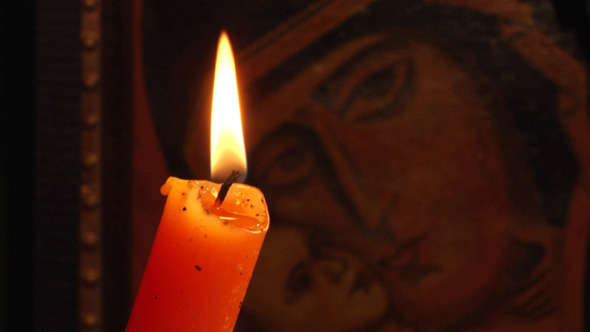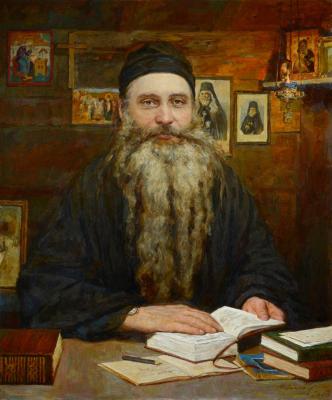Father Seraphim Rose was a monk, priest, and a powerful writer. He believed he had a small window of time to write before the apocalypse.
In them He has set a tabernacle for the sun, which is like a bridegroom coming out of his chamber,
Psalm 19:4-5
And rejoices like a strong man to run its race.

Windows of Space and Time
There are different kinds of windows.
There are windows of space, such as those that open out into the outdoors, that gaze out onto a traffic lined street or a tree stretching its trunks and branches to the sky.
There are windows in Heaven, such as an icon of the Holy Theotokos lit only by a small candle, and her meekness gazes out at you from the illuminated stillness.

And there are windows of time …
I believe it is Henri Bergson who made the distinction between duration and time: time is exterior to the self, duration interior.
So there are windows of duration in which we receive a kind of calling to do something, and there’s a window of time in which we fulfill that calling in the world outside of us.
I suppose in that sense perfect timing is when windows of time and duration open simultaneously; perhaps this is a kind of ‘kairos’ time, the right time to do something, a time that stretches out of time itself …
Not Yet Time
There is yet another kind of time: eschatological time, i.e. a time that is ‘not yet’. A not yet time is wrought with infinite possibility. We cannot comprehend the details of that kind of time.
How are we to know and understand time in this way? How are we to prepare for that kind of time, for the not yet time? …
The Ten Virgins and Time

In the parable of the ten virgins, there was duration and time unfolding before them that revolved around one extraordinary event: the presencing of the Bridegroom. The awaiting of the Bridegroom represented the ‘not yet’ time; the time of waiting for the event; the time that stretched out beyond their comprehension, their control, their ability to know. Duration perhaps in this parable was represented by the lamps, particularly the oil in the lamps that was fuelling the flame, that was holding the light from being extinguished.
All the virgins could do in the face of ‘not yet’ time of the Bridegroom was to make sure they had enough oil to keep their lamps burning. Five of the virgins’ lamps went out; five of the virgins’ lamps stayed lit.
Why didn’t the virgins with the oil share with those whose oil had run out?
The oil seems to be something internal to the virgins. I heard one interpretation that the oil is like a kind of creativity or uniqueness that could not be passed on to anyone else. It was one’s unique calling, one’s unique duration; an interior waiting that therefore could not be given to anyone else.
It reminds me of a little story about a man who came to a village where he saw a woman sitting in silence. “What are you doing?” the man asked the woman. She replied, “I’m on a journey.”
How is your lamp burning?
Got enough oil?
Do you have enough energy to rise and enter into that moment when time and duration are united in kairos, at the time of the event?
The thing with being in that state of duration is that you need to be ready to act when the wind of time opens and the event stands before you; that moment when you are called and you must heed that calling.
Fr Seraphim Rose and the Time to Write
One person who has helped me think of windows of time and duration in this way is Father Seraphim Rose, particularly his account of starting St. Herman Monastery and its corresponding press.
Father Seraphim’s sense of urgency about work was directed most of all to publishing activity of the Brotherhood. His constant concern was to produce as much soul-profiting material as possible with limited time and limited means.
“Above all,” he wrote in a letter, “let us remember that these are the golden years for us to produce what we can in the Lord’s harvest!” In another letter he observed: The future, it is evident, is very dark. We ourselves do not know from one year to the next whether we will have another year of printing activity or not. We pray that God will give us at least a few more years, if only to print those patristic materials which will help us and others to survive in the days ahead.”
Fr. Seraphim Rose Biography, 640
Father Seraphim’s vocation as a writer was directly linked to his sense of duration, time, and event. He believed that the window of time was small and was under threat of closing at any moment. his interior waiting for the end times as it were was spent in prayer, liturgy, fasting, and writing–and he wrote like one who was running out of time or running through time …
Father Seraphim did most of his writing in his humble cell on an old manual typewriter, often by candle light. Above his desk he hung photographs of two revered men who had gone before him in disseminating the Orthodox patristic worldview through the printed word: Ivan Kireyevsky and Archimandrite Constantine of Jordanville.
Unlike some authors, Father Seraphim never took time to warm himself up to writing by taking stroll, etc. Whenever he was given the time he would go quickly to his cell and immediately begin to work. First he would write out a plan or outline by hand, and then he would type an article from that. He would write fast, looking up occasionally. And he would often cross himself when he wrote …
Father Seraphim Rose Biography
What a sense of urgency and one-pointed focus on his vocation of writing! You can see in Hieromonk Damascene’s account of Father Seraphim’s process the candle light of his writing station mirroring the candle light of his heart; his internal response to the ‘kronos’ time of the world become, through duration, a kairos time–the right time to write and produce and distribute Truth.
Hieromonk Damascene continues …

In the spirit of monastic humility, Father Seraphim avoided signing his name to what he wrote. In one of his (unsigned) articles, he wrote that some of the necessities for success in a monastic path outside an already established monastery were: ‘a lack of publicity and a desire to be lost to the world’, the absence of any desire to ‘be somebody’ or do such an important thing as open a monastery’, and a deep humility
Father Seraphim Biography, 640-41
Hieromonk Damascene continues to note that Father Seraphim wrote an immense number of articles often not signing his name to them …
[His] name never appeared in print. In the words of Alexander Pope:
Who builds a church to God, and not to fame, will never mark the marble with his name.
Writing in Kairos
Father Seraphim is a beautiful example of how we can respond to ‘the times’ through our internal sense of duration. Indeed in a marathon sometimes one has to speed up in order to slow back down. How much longer will the window be open for us?
For Father Seraphim, writing in the seventies and eighties, the window at that time was threatening to close–how much more today!
So back to the courtyard, the virgins, the lamps, the awaited Bridegroom …
Your lamp is lit.
You stand to await the event … the encounter with the Bridegroom.

A day everyone will face …
You wait …
How do you wait?
Do you wait as a victim of kronos, external time?
Are you just standing not noticing the state of your lamp, the state of the oil therein?
Or, like Father Seraphim, an example of one who kept watch over how the oil in his lamp burned, are you matching duration with time; are you working, striving, producing, making each day count in expectation of Him?
The lamps burn out around you turning from flame to black …
But you hold on to yours …
You’ve got plenty of oil with you to en-dure the times.
You stand …
You wait …
For the window,
For the gate to open,
And you meet Him face to face,
And the light of your lamp is eclipsed by the radiant splendour of Infinite Love Himself.

One Response